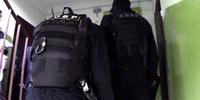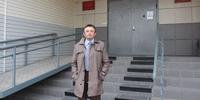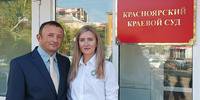The Case of Shulyuk in Nazarovo
Filter
- #
Early in the morning in Nazarov, mass searches are carried out simultaneously in at least 12 houses of local believers. The victims of the searches are 28 people, including children. Most of them are interrogated.
Lieutenant of Justice V. D. Smolin, investigator of the Investigative Committee for the Nazarovsky District of the Krasnoyarsk Territory and the Republic of Khakassia, presents to the believers a decree on "conducting a search in cases that do not require delay." The security forces are looking for electronic devices and "objects of extremist paraphernalia" to confirm "the existence of an organization of extremist orientation and participation in its activities."
As a result of these searches, 43-year-old Ivan Shulyuk was detained. He is placed in a temporary detention center for three days. A criminal case was opened against him under Part 1 of Article 282.2 of the Criminal Code of the Russian Federation. According to the materials of the case, the believer is allegedly a "leader with broad functionality" and "forms a stable opinion about the need to continue the activities of the religious organization "Jehovah's Witnesses" despite its ban." The list of grounds for initiating a criminal case includes "discussion of biblical writings, prayer."
- #
The court decides to imprison Shulyuk in a pre-trial detention center for two months. The judge refuses to includethe opinion of the UN Working Group on Arbitrary Detention because it is allegedly irrelevant.
- #
It becomes known that Shulyuk is still being held in a temporary detention facility in Nazarovo, at 81 Arbuzova Street. Presumably, he will be sent to the pre-trial detention center in Achinsk.
- #
The Krasnoyarsk Regional Court cancels the decision of the Nazarovsky City Court of June 19 to take Ivan Shulyuk into custody and assigns him a new measure of restraint in the form of a ban on certain actions until August 17, 2020. The accused may not leave the house from 6 a.m. to 11 p.m., communicate with unauthorized persons or use any means of communication. Such a preventive measure deprives him of the opportunity to work and provide for his family financially.
- #
Ivan Shulyuk is included in the list of extremists of Rosfinmonitoring. All his accounts are blocked.
- #
Investigator V. D. Smolin submits a petition to extend the ban on certain actions to Ivan Shulyuk until October 17, 2020. Judge of the Nazarovsky City Court of the Krasnoyarsk Territory T. V. Okhotnikova does not find sufficient grounds for this, taking into account the positive characteristics of the believer. The measure of restraint is canceled.
- #
A measure of restraint in the form of a written undertaking not to leave is chosen in relation to the believer.
- #
Investigator M. S. Kozharin takes over the criminal case against Ivan Shulyuk.
- #
The case goes to the Nazarovsky City Court of the Krasnoyarsk Territory. It will be considered by judge Lev Afanasyev.
- #
The judge allows the defendant's wife to attend the hearing, despite the restrictions associated with the COVID-19 pandemic.
The prosecutor announces the charges, the defendant and lawyers express their attitude to the charges. The study of written evidence begins.
- #
The prosecutor reads out the "evidence" of the defendant's guilt: religious texts in an abbreviated version, the biblical story of Joseph, quotes from the Holy Scriptures about showing respect for the authorities, etc.
The prosecutor accuses the defendant of organizing meetings of believers, indicating the dates on which, in fact, the defendant was in the pre-trial detention center and could not hold them.
The prosecution draws attention to personal photographs and spiritual texts found in Shulyuk's computer. The defendant says that the seized materials reflect the ordinary life of a Christian and are not extremist.
- #
Defendant Shulyuk says that believers learned to show love in practice to both friends and strangers, which is the exact opposite of extremism. He also explains that the believers held a worship service, not a meeting of a local religious organization. Makes an oral request to listen to audio recordings of worship services, as they differ from the text of the transcripts. The prosecutor opposes, the judge does not object.
- #
The judge satisfies the petition previously filed by Shulyuk to return to him the electronic devices seized during the search.
- #
The prosecutor continues to read out the materials of the criminal case, which, among other things, contain recordings of Bible discussions and prayers.
- #
During the interrogation, two witnesses for the prosecution say that they attended services of Jehovah's Witnesses, but did not personally know the defendant Shulyuk.
- #
Interrogation of prosecution witnesses. Among them is an FSB officer who informs the court that it is possible to practice religion without being a member of a local religious organization.
Witnesses in their testimonies note that at the services they read the Bible voluntarily, no one forced them to do so, they did not hear calls for extremism.
- #
Interrogation of two prosecution witnesses. They explain to the court that the faith of Jehovah's Witnesses is based on the Bible and does not depend on the presence or absence of a legal entity.
- #
During the interrogation of FSB officer Toldin, the defense explains to the court that holding worship services via video link is a manifestation of law-abiding citizens during a pandemic, and not a "conspiracy".
- #
The court listens to the entire audio recording of the speech on a biblical topic. Ivan Shulyuk explains that this is a recording of a divine service of a group of believers, and not a meeting of the LRO.
- #
The court listens to an audio recording of another Bible-based lecture in which the speaker says that the religion of Jehovah's Witnesses is not prohibited by law. The defendant draws attention to the fact that the believers had no doubt that they were not breaking the law.
- #
The case materials are selectively read out. The conclusions of the examinations state that the faith of Jehovah's Witnesses is not prohibited, and there are no signs of extremism in the materials studied. A diploma from the head of the city for the Day of Housing and Public Utilities Workers, issued to Ivan Shulyuk during the criminal prosecution, and positive characteristics from various departments are also read out.
- #
The lawyer asks the defendant about his involvement in the activities of the Local Religious Organization of Jehovah's Witnesses. Ivan Shulyuk answers: "I believed in Jehovah God before the appearance of the LRO in Nazarovo and I believe after the termination of its activities." He adds: "After reading the decision of the Supreme Court of the Russian Federation of 20.04.2017, I realized that individuals can continue to believe, and this is not a violation. I came to the conclusion that as part of a religious group, I have the right to practice my faith."
The defendant testifies to the court by reading out his written notes. The defendant explains: "The fact that I communicated with fellow believers on biblical topics, sang religious songs, is not a resumption or continuation of the activities of any banned organization." The believer emphasizes that the material evidence and electronic documents examined in court testify only to the religious affiliation of their owners, and not to the fact of committing a crime.
"Neither the Supreme Court nor the Government of the Russian Federation consider the practice of the religion of Jehovah's Witnesses to be unlawful actions. I also share their point of view," Shulyuk said at the end of his speech.
- #
Despite the objection of the prosecutor, the court makes a decision on the re-appointment of a comprehensive linguistic examination, but in a new institution.
15 people come to the courthouse to support Ivan Shulyuk. The believer's wife is allowed to attend the meeting.
- #
The court sends the case materials for linguistic examination.
- #
The meetings are postponed until January of the following year until the examination is ready.
- #
During the debate, the prosecutor requested a sentence for Ivan Shulyuk — 6 years and 2 months in a penal colony.
Ivan Shulyuk delivers his final statement.
11 people are watching what is happening in the courtroom - for the first time in the entire trial, the judge allows listeners to be present after the declared petition for publicity.
In his final statement, Ivan tells the court about the shooting of his grandfather and the expulsion of the rest of his relatives to Siberia during the Stalinist repression because they were Jehovah's Witnesses. Declaring that he cannot give up his beliefs, the believer explains: "This is my spiritual heritage."
The last word of the defendant Ivan Shulyuk in Nazarov - #
- #



